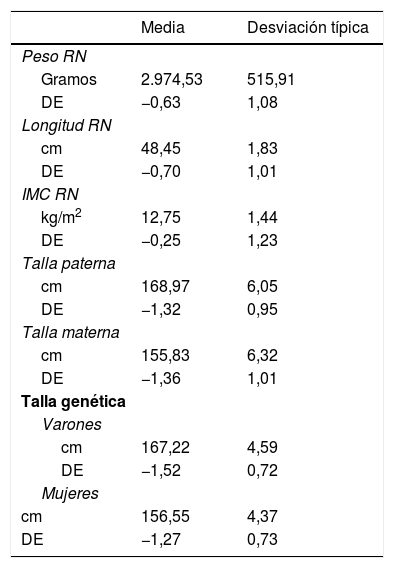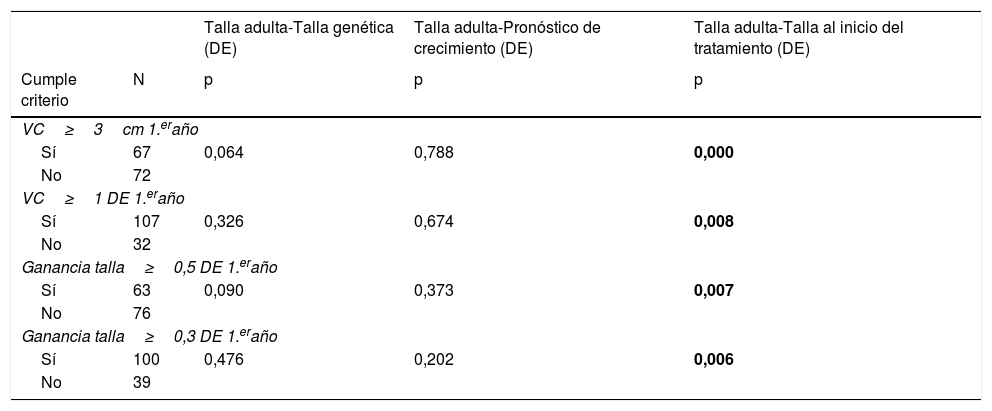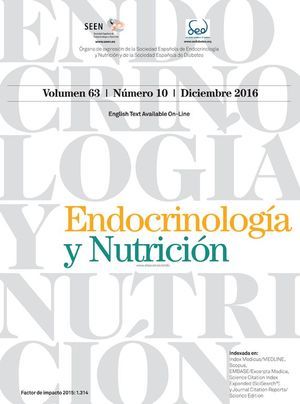La talla baja es el principal motivo de consulta en endocrinología pediátrica, precisando en ocasiones tratamiento con hormona de crecimiento.
ObjetivoEvaluar la relación de los factores de buena respuesta al tratamiento con hormona de crecimiento durante el primer año con la respuesta final y valorar si existen diferencias según el tipo de déficit.
Pacientes y métodosEstudio longitudinal, retrospectivo y observacional en 139 pacientes tratados por déficit de hormona de crecimiento idiopático (severo o parcial) hasta talla adulta. Criterios de buena respuesta en el primer año de tratamiento: a) incremento velocidad de crecimiento≥3cm/año, b) velocidad de crecimiento≥1 desviación estándar (DE), c) incremento talla≥0,5 DE, d) incremento talla≥0,3 DE. Estudio del índice de repuesta al tratamiento al primer y segundo año. Variables de respuesta final: talla adulta, talla adulta respecto a talla genética, talla adulta respecto al pronóstico de crecimiento inicial y talla adulta respecto a talla al inicio del tratamiento.
ResultadosEl tratamiento produce una ganancia de talla adulta con respecto a la talla genética de 0,06±0,7 DE. Los pacientes buenos respondedores el primer año de tratamiento presentaron una mejor respuesta final (velocidad de crecimiento≥3cm, p=0,000; velocidad de crecimiento≥1 DE, p=0,008; ganancia talla≥0,5 DE, p=0,007; ganancia talla≥0,3 DE, p=0,006), así como los pacientes con déficit severo (p=0,04). El índice de respuesta al tratamiento al primer año asocia una mejor respuesta final (r=0,249; p=0,003), manteniéndose el segundo año (r=0,294; p=0,01).
ConclusionesEl tratamiento con hormona de crecimiento alcanza la talla genética. El porcentaje de buenos respondedores varía según el criterio. La respuesta al primer año de tratamiento y un déficit severo son factores determinantes para conseguir una buena respuesta final.
Short stature is the most frequent reason for Pediatric Endocrinology consultations and sometimes requires treatment with growth hormone.
ObjectiveThe possible correlation of a good response to any early response factor with a better final response was studied, and also whether there was a difference in response to treatment according to the type of deficit.
Patients and methodsThis was a longitudinal, retrospective and observational study of 139 patients treated for idiopathic growth hormone deficiency up to adult height. There were good response criteria in the first year of treatment: a) an increase in growth rate≥3cm / year, b) a growth rate≥1 standard deviation (SD), c) an increase in height≥0.5 SD, d) an increase in height≥0.3 SD. Study of the Index of Responsiveness to treatment in the first and second year. Final response variables: adult height with respect to target height, adult height with respect to initial growth prediction and adult height with respect to initial height at the start of treatment. The possible correlation of a good response to any of the early response factors with a better final response to treatment was studied, and also whether there was a difference in the response to treatment according to the type of deficit.
ResultsThe treatment produced a gain in adult height with respect to genetic height of 0.06±0.7 SD. Patients considered good responders in the first year of treatment presented a better final response (growth rate≥3cm: p=0.000, growth rate≥1 SD: p=0.008, height gain≥0.5 SD: P=0.007, height gain≥0.3 SD: P=0.006), as well as patients with a severe deficit (P=0.04). The index of responsiveness to treatment during the first year was associated with a better final response (r=0.249, P=0.003), with this correlation being maintained in the second year (r=0.294, P=0.01).
ConclusionsGrowth hormone treatment increased height in the genetic target. The percentage of good responders varied depending on the criteria used. The response in the first year of treatment and a severe deficit were determining factors for achieving a good long-term response.
Artículo
Comprando el artículo el PDF del mismo podrá ser descargado
Precio 19,34 €
Comprar ahora











